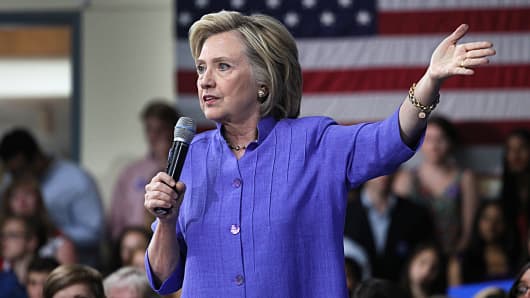Right now, the Hillary Clinton campaign is running a publicity campaign, when in reality they should be running a crisis campaign. This is one of the biggest reasons for Clinton's continuing drop in public opinion polls. Her PR team is fundamentally running the wrong type of campaign and it is leading to negative news that is swaying voters.
The Clinton campaign is still trying to stick with the initial narrative that Hillary is a champion of the middle class, even when voters and the media are distracted with new negative developments that arise weekly.
Read MoreWhat Trump and Bush did wrong in the debate
Journalists want to better understand how a personal server with potentially top-secret information ended up in her home – potentially without any encryption. At the same time, voters have a right to question why someone with Clinton's experience would want a personal server in her home.
Clinton originally said she didn't want to carry two devices, but anyone who owns a smart phone knows you can have multiple email accounts on one phone. It was a poorly thought-out response to a question her crisis team should have seen coming.
The latest Franklin Pierce University/Boston Herald poll out this week shows Sen. Bernie Sanders is now leading Clinton in New Hampshire by 7 percent — a huge momentum changer. For the first time — true or not — voters will start to wonder if there is more vigor to this Sanders movement.
Read MoreWhat Bernie Sanders needs to do to beat Hillary
But the news gets worse for Clinton, providing more proof that this is a crisis campaign. A Quinnipiac University poll from July 30th shows Clinton is sliding in other crucial categories, involving trust, leadership and how much she cares about voters.
And it doesn't stop there — the latest news involves the Justice Department, the Inspector General of the U.S. Intelligence Agencies and the FBI. (There are so many new developments this week alone that you need to Google it). It's getting harder by the week for the Clinton campaign to blame this on partisan politics since all of those government agencies are nonpartisan.
So how does the Hillary Clinton campaign respond to this week's barrage of negative news?
Her campaign spokesman, Nick Merrill, was quoted on Tuesday as saying his boss has "pledged to cooperate with the government's security inquiry, and if there are more questions, we will continue to address them."
That sounds a lot like the statement I read back in March when this email server scandal first unfolded, which brings up a second major flaw that explains why Clinton's campaign is faltering in public opinion polls.
Her campaign isn't adapting fast enough.
A structurally sound media campaign requires little maintenance when it is launched correctly, but in a crisis campaign, the answers must change with the developments. It needs to constantly evolve and adapt based on new information.
But Clinton's PR machine isn't doing that. Their answers seem to be the same, scripted statements, week after week, regardless of new developments.
Read MoreHow Hillary Clinton can win back public trust
So why is the Clinton PR machine running the wrong campaign when she is supposedly surrounded by the best minds in the business?
Most of her top campaign advisors come from the State Department, beginning with her spokesperson who deals directly with the media. Yes, policy matters in politics, but when it comes to the public, voters and journalists don't want to hear a politician speak like a diplomat. It's one of the reasons why Trump scores so high in public opinion polls. He says it like he sees it.
There is still time for Clinton's PR machine to turn around these plummeting poll numbers, but they need to act like this is an emergency — an emergency of crisis proportions.
Commentary by Mark Macias, head of Macias PR, a global public-relations firm, that has run media and branding campaigns for politicians, tech start-ups, financial firms, nonprofits and companies. He's also author of the book, "Beat the Press: Your Guide to Managing the Media." Follow him on Twitter @markmacias.



